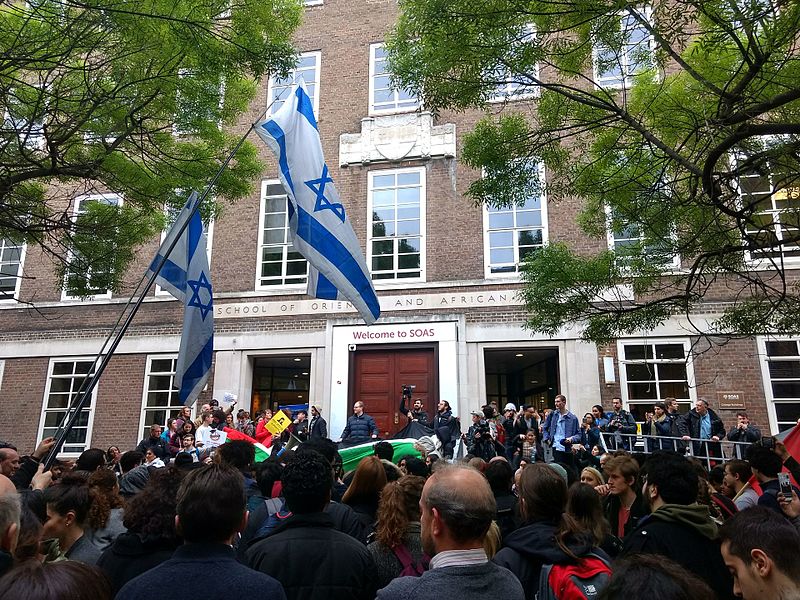For Jewish students, college can be demoralizing. Israel is singled out and denounced as a racist aggressor by figures of authority on campus—student leaders, professors, and esteemed visiting speakers. Israel Apartheid Week is a fixture at numerous institutions, propagating the slanderous lie in its name. A recent report by the Israel on Campus Coalition found that “the highest recorded level of anti-Israel disruptions of pro-Israel events” occurred in the 2018-19 academic year.
At the University of Florida last month, former Israel Defense Forces’ paratrooper Yoni Michanie faced an aggressive protest from anti-Zionist students. Speaking at a university whose student body is 18 percent Jewish, he was called a “filthy colonialist” and “war criminal.” Almost 100 students staged a walk-out, disrupting Michanie’s talk. In October at Duke University, former Israeli Foreign Minister Tzipi Livni was met with a disruptive protest at an event hosted by the Program on American Grand Strategy. During the question-and-answer session, anti-Zionist students also walked out, pointing their fingers at Livni with cries of “shame” and “you don’t belong here” as they stormed out of the room.
Natalie Ecanow, a junior at Duke and a Summer Fellow in 2019 for the Tikvah Fund, was disappointed in her fellow students. “It was discouraging to see a group of students so intent on preventing productive discussion. The undue display of disrespect reflected poorly on the Duke student body as a whole.”
How should Jewish students respond to this intolerance?
In the meantime, what can be done for those who have already placed their confidence in American institutions?
We cannot avoid fighting back. Leaving BDS motions and anti-Israel lies unchallenged will hand an easy victory to anti-Zionism. But those leading the fight need a strong, intellectual foundation on which to base their arguments.
At the University of Chicago, Tikvah alumni Raina Weinstein, Daniel Gutkind and Ilan Wolff are choosing fight over flight—with a difference. They launched “Debating Zionism,” a seminar supported by the Tikvah Fund which aims to foster serious engagement with Zionism. Developed with the aid of Israeli scholar Micah Goodman, the curriculum promotes text-based learning and discussion. Students explore Zionist history through the ideas and debates of its intellectual giants—from Theodor Herzl and Rav Abraham Isaac Kook, to Ahad Ha’am and Ze’ev Jabotinsky.
Raina, the primary organizer, explains that aside from Orthodox learning, before this no student had been exposed to meaningful Jewish texts in a campus setting. “These seminars bring Jewish students of all backgrounds together to spur on non-tactical questions. Not just to talk about preventing the next BDS hearing—but engaging intellectually.” A seminar with this curriculum has never been launched before by students on a college campus.
Ilan Wolff, also a senior, says that these seminars act as an educational foundation for students who want to be able to answer difficult questions about Israel. He recounts a conversation with a non-Jewish friend who was philosophically opposed to a Jewish state. “Religion and state should be separate; why should a Jewish state exist?” he asked. Ilan’s background from Tikvah seminars and his own reading gave him a better foundational justification for why the Jewish people should have the right to self-determination. “Preparing other students in that vein would allow them to have those kinds of conversations as well,” he says.
At a time in which students with different political positions refuse to even speak to one another, “Debating Zionism” also provides a space for civil and fruitful discussions. Indeed, the proliferation of anti-Semitism is a sign of much deeper societal malaise. Anti-Semites wish not just to destroy Jews, but free societies as a whole. Jewish students are uniquely placed to lead in preserving the values of free speech and civility.
For Daniel Gutkind, text-based discussions are invaluable. “As Jews, this is our state, this is our heritage. In order to appreciate it, we have to understand what it is,” he says. Daniel is studying abroad at the University of Oxford, where he organizes a version of the “Debating Zionism” curriculum. “Zionism and Manischevitz” has attracted almost 100 attendees. Leaders on five new campuses are working on setting up similar seminars, too.
Jewish students’ dedication to tactical questions about fighting BDS motions and Israel Apartheid Week is essential. But it can inadvertently detract from meaningful engagement with Israel. With a target on their backs, going on the defensive becomes the de facto sum of their identities. These seminars offer Jewish students the opportunity to engage with one of the great political stories in human history on their own terms.
The Jewish tradition is rich with philosophical debates between great thinkers—debates that have driven commitments to Judaism and Israel for centuries. In order to challenge rising anti-Semitism, Jewish students need a strong educational foundation in these debates. They need to know what they are fighting for.
Tamara Berens was a former campus associate with CAMERA on Campus and president of the King’s College London Israel Society in 2017-18. An alumna of Tikvah’s 2019 Summer Fellowship, she is currently a Krauthammer Fellow at “Mosaic” magazine.


























